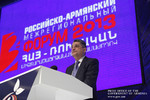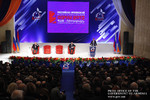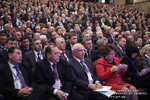Monday, 2 December 2013
Remarks By Prime Minister Tigran Sargsyan At Third Armenian-Russian Interregional Forum
Distinguished Guests,
Ladies and Gentlemen!
On behalf of the Government of the Republic of Armenia and myself, I would like to welcome and thank the participants of the third inter-regional forum. Of course, this event is particularly important in that it is held in the frame of RF President Vladimir Putin’s state visit to Armenia.
This conference is of special relevance as it deals with an important topic, namely our country’s cooperation prospects as seen from the perspective of the ongoing integration processes. Our choice was triggered by Armenia’s willingness to join the Customs Union and, subsequently, the Eurasian Economic Union.
Armenia’s decision to join the Customs Union was above all based on the undeniable fact that tackling challenges called for a collective effort. In particular, providing favorable conditions for sustainable economic growth and building a highly competitive economy is quite a difficult and sometimes even an unsolvable problem for countries with limited resources and a small market such as Armenia. It seems to be twice as complicated if we take into account the geopolitical situation in which we have to develop our country’s economy.
Thus, the desire to ensure sustainable economic growth and competitiveness was at the heart of our strategic decision to join the Customs Union. The search of implementation mechanisms and pathways brought us to a natural and reasonable conclusion about the need to get full membership in the Union, which incorporates our close political allies, the CSTO member- States and our main economic partners.
Secondly, it appears to be clear that economic cooperation with Russia is of paramount importance to Armenia. Russia is our main trading partner and the biggest investor in the economy of our country. Russia plays a crucial role in infrastructure development in Armenia and has a stake in the development of the strategic sectors and backbone enterprises such as Nairit and the Armenian NPP.
It is an undeniable fact that economic relations between our countries have been constantly evolving during the years of independence. Upholding the stated dynamics calls for systemic improvement of cooperation mechanisms, but at the moment we have come to the highest point of bilateral cooperation, which could be achieved using conventional tools.
The further development of economic cooperation between Russia and Armenia, which is reflected in the long-term economic cooperation program until 2020, should be aimed at diversifying bilateral trade and economic relations and providing structural and technological conditions for structural and technological modernization of our economies,
The aforementioned problems can be solved in an economic environment that will rule out any boundaries or barriers to the integration of the two economies.
Thus, the decision to join the Customs Union was of a balanced character with a fully rational explanation, namely to provide conditions necessary for an effectively developing economy.
The third question that I would like to answer can be formulated as follows: What is Armenia bringing to the Customs Union? We are confident that we can bring in fresh approaches and new ideas in the CU workings.
Suffering from a transport blockade and short of natural resources, our country has no alternative to following an open and functioned effectively model of economic development. Moving in this direction over the past few years, we have achieved significant progress in the reform of our institutions in line with international best practices and standards.
This is especially true in terms of strengthened and improved public governance and favorable conditions for business and investment in the country. Here, I would like to note that according to the World Bank’s Doing Business report, Armenia boasts the highest index in the CIS and ranks 37 among 188 some countries.
Besides, as another comparative asset, the use of which can be mutually beneficial for both Armenia and the countries of the Eurasian Economic Union, we can state the geographical proximity and the traditionally friendly relationship with the Middle East countries.
I would also note that Armenia enjoys a GSP + (Generalized System of Preferences) regime with the European Union that helps numerous Armenia-based companies, including the Russian ones, to sell their goods in the EU without any restrictions and customs fees.
In this regard, it is my pleasure to inform you that the European Court has upheld the claim of Rusal to abolish the EU Regulation, which used to impose an anti-dumping duty on our company. This means that the European market will be open to Rusal, and we will be able to export the goods manufactured by some 1450 enterprises using the GSP + regime. Of course, this is adding to Armenia’s investment attractiveness.
If we add to this the free trade zone that we created together with our Russian partners on the basis of Mars factory and Mergelyan research institute, we can see that Russian investors may benefit from investing here and enjoy tax benefits.
And lastly, I would like to summarize our vision of the integrated union and the system of basic principles and values with the following theses. Firstly, intellectual activity is generally believed to be the key to development in the 21st century. This in turn means that the man is the driving force of development, and infrastructure should be created specifically for creative people giving them the opportunity to fulfill their potential. Based on the above, we can formulate the second thesis, namely that nations can unify (integrate) through interconnected individuals. That is, we should create such conditions as may bring proactive, creative people together. Such people must become the locomotive of association.
Secondly, integration should provide a business-friendly environment. We must keep focus on the development of small and medium-sized businesses. If we manage to achieve tangible results in this regard, there will be a lot of economic entities involved in the success of the integration process.
Thirdly, the impact of the integration should be felt by all citizens. Integration has to change people’s lives. In this way, we will have masses interested in successful and deeper integration. In other words, integration will be irreversible, if supported by ordinary citizens. It is only possible, if they come to understand that the process of integration can gradually improve their living standards.
Fourthly, combating challenges and threats in the 21st century will be easier through joint effort. Therefore, it is more than obvious that supranational structures need establishing rather than trying to confront these problems on one’s own. Those integration processes taking place within the EEC call for consistency in this important initiative.
We are convinced that integration should be primarily based on shared values and the nations’ integrity in their aspiration for rapprochement and cooperation. I feel that the new stage of our dialog will bear on those values that can unite us and make it possible to create a shared vision of our future.
Thank you.









